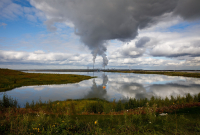His research in the lab and the field was published in some of the world's top journals, but that was never enough for David Schindler, who died Thursday at age 80.
"The importance of David Schindler was his ability to talk truth to power," said Jim Handman, a longtime science journalist and journalism professor.
"He was extremely brave in doing that at a time when very few scientists in this country were willing to challenge politicians and put themselves on the line."
Few Canadian scientists — Schindler held joint Canadian-U. S. citizenship — can claim the influence on public policy achieved by the bluff, straight-shooting University of Alberta ecologist, who was known to call politicians "turkeys" if that's what his reading of the data suggested.
In the 1970s, Schindler pioneered a study of acid rain at Ontario's Experimental Lakes Area. By gradually adding acid to a lake under controlled conditions, he was able to link the toxin to effects that were being seen in thousands of lakes across Central and Eastern Canada and in the United States.
His work was at the heart of talks between prime ministers and presidents and helped prod the U.S. and Canada to sign 1991's Acid Rain Treaty, one of the most successful environmental accords ever signed.
In the early '90s, Schindler was a major part of the Northern River Basin Study, a five-year effort looking at the health of the vast Peace-Athabasca River Basin, one of the largest in the world, as it came under increased pressure from industrial development such as pulp mills.
That study brought together diverse perspectives from industrial to Indigenous in a way that was unique at the time. It set a framework that is still referred to today for understanding and regulating the area.
In 2010, he and co-author Erin Kelly published some of the earliest work showing that contaminants from oilsands developments were showing up on land and in water.
The work was hugely controversial, especially in Alberta, but it led to a federal review of how the province tracked environmental impacts and resulted in legislation still in place that requires industry to chip in $50 million a year for environmental monitoring.
"His personality, his booming voice, the way in which he dealt with reporters was a skill that many of us find to be quite a challenge," said his University of Alberta colleague Mark Boyce. "He had a special knack and a special communications style that was very effective."
That voice wouldn't have been heard unless the science was top-notch. Schindler regularly published in some of the world's best journals, including Nature, Science, and the Proceedings of the National Academy of Sciences.
He won at least 18 medals and prizes in Canada and abroad and was a member of four elite Canadian and international scientific societies.
Boyce remembers how Schindler loved the cut and thrust of scientific debate.
"We had some long-standing disputes," he recalled.
"He just delighted in being challenged and thinking through various topics. It was wonderful to have a colleague who delighted in challenge and complexity."
"He knew what the important questions were," said John Smol, a Queen's University ecologist who worked with Schindler. "Almost every important problem with water, he was on the front line."
Water was also where he turned for pleasure. Schindler was a passionate fly fisherman and legend has it that he convinced then-federal environment minister Jim Prentice on the importance of oilsands monitoring while the two were on an angling trip.
He mushed dogs, too, and raced teams for years.
"He was very good at it," said Boyce.
"When I first came to Edmonton, he had 90 dogs. He'd buy a semi-truck full of chicken scraps in the early winter to keep his dogs going.
"He was crazy about dogs."
Even when he was out on the water casting a fly, Schindler would still cast his mind to his research and the problems he was trying to unriddle.
"He was not divorced from that while we were out fishing," said Boyce. "An interest in the environment is something that dominates your life."
Schindler, whose health had been in decline for two years, died in Brisco, B.C., where he had retired with his wife and fellow scientist Suzanne Bayley. Although he had stepped back from public life — increasing deafness made him a difficult interview — he had lost none of his passion.
In an email last summer to The Canadian Press, Schindler quoted a saying of his grandfather's in reference to politicians and industry officials who turn a blind eye to science: "Too low to kick and too slimy to step on."
This report by The Canadian Press was first published March 8, 2021.






Comments